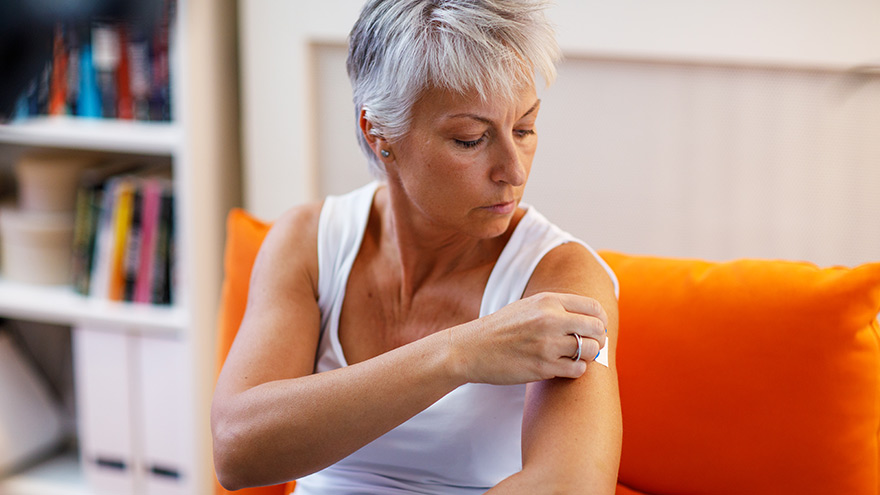Dr. Carilyn Hoffman's Guide to Menopause Medication & Relief
By: Tori Bowlin
April 11, 2024

Women undergo multiple hormonal changes throughout their lives, leading to different physical and emotional experiences. Dr. Carilyn Hoffman, at Renown Women's Health, explains these confusing life stages and helps decode menopause.
Perimenopause: Transitioning Towards Menopause
Defined as the time "around menopause," perimenopausal symptoms are caused by hormonal fluctuations that occur as the ovarian function declines. Levels of estrogen and progesterone decrease, and follicle stimulating hormone increases. These hormonal fluctuations may cause a range of symptoms including:
- Irregular or abnormal periods: Initially cycles intervals vary in length by greater than 7 days, then in later stages the interval increases to greater than 60 days between cycles
- Hot flashes and night sweats: This is the most common symptom and 50-82% of women will have vasomotor symptoms
- Mood swings and memory problems
- Anxiety or insomnia
- Heart palpitations
- Decreased libido and vaginal dryness
- Weight gain and thinning hair
- Increased risk of urinary tract infections
- Decreased bone density
Menopause
Menopause is defined as year without a menstrual cycle and marks the timeframe when the ovaries stop making estrogen. This signifies the end of the reproductive years. The average age of menopause is 51; however, the menopausal transition can last about 8 years. This means that women in their late 30’s and 40’s may start to have symptoms of perimenopause.
The worst vasomotor symptoms are typically experienced at the one-year mark since the last period. Unfortunately, some women experience symptoms throughout the entire menopausal transition.
Postmenopausal
After 12 months without a menstrual cycle, a woman is confirmed to be postmenopausal. This is sometimes difficult to define, as women may have had procedures that cause menstrual suppression such as a uterine ablation or hysterectomy or they may still be on contraception. Sometimes, lab work may be recommended to help determine menopausal status. However, due to the broad time period that the menopausal transition occurs and the variations in normal hormone levels throughout a cycle, lab work is not always helpful.
Dr. Hoffman explains the importance of thorough counseling for patients seeking to "check their hormone levels." She emphasizes that menopause is diagnosed clinically, focusing more on the individual's symptoms rather than lab values. This approach ensures that patients understand the implications of the test results and the treatment strategy.
Menopause Medical Management
Medical management of symptoms should be tailored to the individual’s concerns.
Abnormal Bleeding:
- There are a range of medications, IUDs and procedures available if the main concern is irregular or prolonged menstrual bleeding during perimenopause.
Hot Flashes and Night Sweats:
- Hormone Replacement Therapy (HRT): HRT is currently the most effective method for relieving vasomotor symptoms. However, it's important to discuss potential risks with a healthcare provider, as HRT can increase your risk of blood clots and breast cancer. If improperly prescribed, it can also increase the risk of uterine cancer. The American College of Obstetricians and Gynecologists recommends the lowest dose for the shortest duration.
- Low-dose antidepressants: SSRIs/SSNIs may mitigate hot flashes and mood disorders for those who are not candidates or prefer to avoid HRT. Currently, only Paroxetine is FDA-approved for this use.
- Fezolinetant: This is a newly FDA-approved non-hormonal medication that works at the brain's level to treat vasomotor symptoms.
- Gabapentin: This is an anticonvulsant medication that has been shown in several studies to be helpful for vasomotor symptoms, but it is not currently FDA-approved.
- Vaginal estrogen: Vaginal dryness and pain with intercourse due to thinning vaginal tissue is a common symptom of menopause. Vaginal estrogen is highly effective at decreasing these symptoms and has fewer side effects than systemic HRT.
- Ospemifene: This is a selective estrogen receptor modulator that is a non-hormonal FDA-approved medication for severe vaginal dryness.
Natural Symptom Relief Strategies:
- Nutrition: Incorporate calcium, vitamin D, and high-quality protein to support bone health and muscle maintenance. There are limited studies on phytoestrogens (found in soy and tofu) and vasomotor symptoms. While the data doesn’t necessarily support that these phytoestrogens relieve symptoms, no detrimental effects were found and these tend to be high quality and healthy proteins.
- Exercise: Regular physical activity can ease menopausal symptoms and support weight management. Data doesn’t support that this reduces vasomotor symptoms, but it can be helpful in weight management and sleep quality.
- Beverage choices: Limiting alcohol and caffeine can help decrease the frequency of vasomotor symptoms and may also improve sleep quality.
- Alternative remedies: One study shows that Chinese herbal medicine and acupuncture are effective at relieving vasomotor symptoms. There is not enough evidence to recommend Black Cohosh, and it is associated with liver toxicity in high doses. Studies don’t show that St. John’s Wart or Gingko Balboa are any better than placebo. Always mention your alternative medical therapies to your provider as some do interact with other prescribed medications.
By understanding and recognizing that the symptoms of menopause are real and treatable, women are empowered to manage this transition better and can maintain their well-being and quality of life. Please schedule an appointment with Renown Women’s Health if you’d like to discuss your menopause symptoms with a provider.
Women's Health Services
Our dedicated team understands your unique health needs and is here to support you every step of the way.
